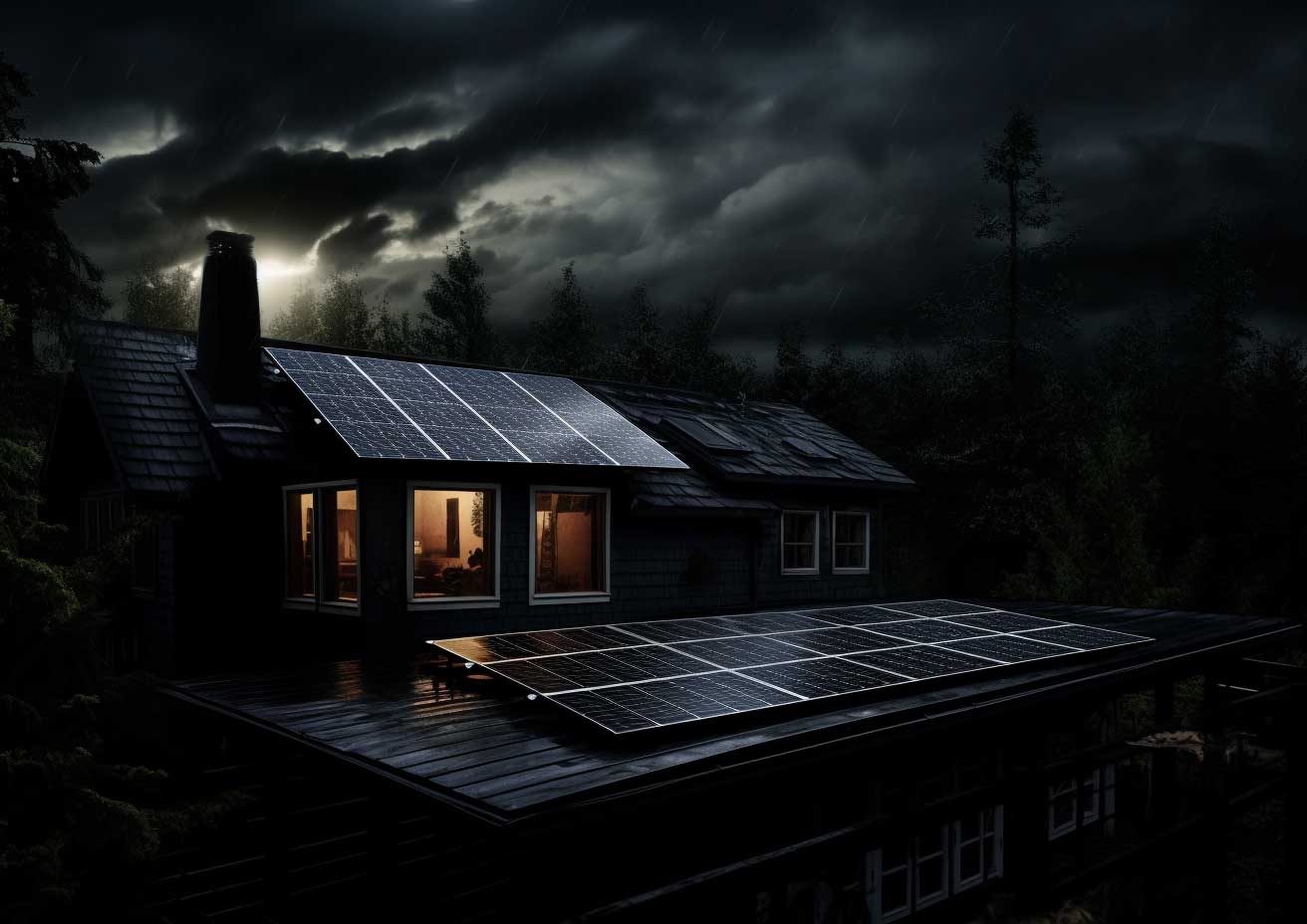Solar photovoltaic PV panels are designed to convert sunlight into usable energy. Generally, solar panels work best when they receive direct sunlight, allowing them to generate maximum power output. However, the performance of solar panels on cloudy days and in cloudy weather conditions is a common concern among homeowners considering solar installation.
This informative article serves as your beacon of clarity in the complex world of solar energy. We will embark on a journey to simplify the often mystifying technical aspects of solar panel functionality, shedding light on the factors influencing their performance. By the end of this comprehensive guide, homeowners will not only grasp the intricacies of solar power but also gain the insights needed to harness the sun’s boundless energy effectively. So, let’s embark on this illuminating quest to understand the true potential of solar panels, come rain or shine.
The Power and Potential of Solar Panels in Generating Electricity
Solar panels are devices that harness the power of the sun to generate electricity. They are composed of photovoltaic cells, which convert solar radiation into usable electricity. These panels are often installed on rooftops or in open spaces to maximize exposure to direct sunlight. On a sunny day, solar panels can produce substantial energy, contributing to significant savings on an electricity bill and reducing reliance on non-renewable energy sources.
How Do Solar Panels Work on Cloudy Days?
To answer your question, will solar panels work on cloudy days? Yes, they can still generate electricity, but the performance may be slightly reduced compared to sunny days. While solar panels produce the most electricity under direct sunlight, they can still generate significant energy even in cloudy conditions. This is because solar panels can still utilize diffuse sunlight, which is the sunlight that passes through clouds and is scattered in different directions.
When there is a cloudy day, the intensity of direct sunlight is reduced, leading to lower solar radiation reaching the solar panels. As a result, the solar panel output may decrease, resulting in slightly lower energy production. However, solar panels are designed to capture and convert as much sunlight as possible, meaning they can still generate electricity even with indirect sunlight.
Overall, while solar panels work on cloudy days, their efficiency and power output may be slightly reduced compared to sunny days. However, advancements in solar panel technology, such as higher efficiency panels and the use of battery storage, are continually improving the performance and reliability of solar energy systems, making them a viable and sustainable option for renewable energy production.
Evaluating Solar Panel Performance: How They Operate Even on Cloudy Days
Several factors influence how well solar panels work on cloudy days, regardless of weather conditions. It’s essential to consider these factors to optimize solar energy production:
Sunlight Exposure
The efficiency of solar panels is directly correlated to the amount of sunlight they are exposed to. Typically, solar panels work best on sunny days with direct sunlight. However, their efficacy on cloudy days should not be underestimated. Though solar panels may not produce as much electricity on a cloudy day as on a sunny day, they can still generate significant solar energy.
Panel Angle
The angle at which solar panels are installed plays a crucial role in their ability to capture sunlight effectively, even on cloudy days. Solar panels are designed to harness solar energy and convert it into electricity. Still, their performance depends on various factors, including how much direct sunlight they can receive. Cloudy weather and cloud cover can hinder the amount of direct sunlight available to solar panels, reducing their energy production. However, panel angle optimization can help mitigate the impact of cloudy conditions on solar panel output.
Types of Clouds
Solar panels can still work on cloudy days, although different types of clouds can impact their energy production efficiency. The intensity and thickness of the cloud coverage will directly affect the amount of sunlight that reaches the solar panels. Thick, dark rain clouds can significantly reduce solar panel efficiency as they block and absorb a more significant portion of the solar radiation, resulting in lower solar panel output. On the other hand, thinner, white clouds allow more sunlight to pass through, although they still scatter and diffuse the sunlight, reducing the direct sunlight available for energy production.
Solar Technologies for Cloudy Environments
For homeowners in areas prone to cloudy weather, it’s wise to consider solar technologies that perform better in such conditions. Let’s discuss some of them:
Advanced Monocrystalline Panels
Advanced monocrystalline panels are a noteworthy option for cloudy environments. These panels feature cutting-edge technology that enhances their efficiency even in low-light situations. They are more efficient at capturing sunlight at various angles, ensuring consistent energy production throughout the day.
Efficiency Boosters
In addition to panel selection, homeowners can consider efficiency-boosting measures. Installing solar trackers that follow the sun’s path can help panels maintain an optimal angle to capture sunlight, maximizing energy production, even on cloudy days.
Hybrid Systems
Consider hybrid solar systems that incorporate energy storage solutions like solar batteries. These batteries store excess energy generated during sunny periods, ensuring a reliable power supply during cloudy days or at night. Combining advanced solar panels with energy storage can provide homeowners a consistent and sustainable energy source.
Incorporating these key points into your decision-making process can help homeowners make informed choices when selecting the right solar technology for their environment. Whether you opt for thin-film panels, advanced monocrystalline panels, or a combination of both, tailoring your solar solution to your local weather conditions ensures you make the most of your renewable energy investment, even in cloudy climates.
Energy Storage: The Role of Solar Batteries
Solar batteries ensure a continuous electricity supply, even on cloudy days or during reduced sunlight. Solar panels, the key components of a solar system, convert solar radiation into electricity through the photovoltaic effect. However, their power output is significantly affected by the availability of direct sunlight. Cloudy conditions or a lack of direct sunlight can lead to a decrease in solar panel efficiency and solar panel output.
Solar batteries are an integral component of a solar panel system, offering a solution to the intermittent nature of solar energy production. By storing excess energy, solar batteries enable the utilization of solar power during cloudy conditions or at night, thereby enhancing the reliability and independence of renewable energy sources.
Do Solar Panels Work On a Cloudy Day?
Solar panels are a reliable source of energy, even on cloudy days. While direct sunlight is ideal for maximizing solar panel output, solar panels can still generate electricity from diffuse sunlight or indirect sunlight. Cloudy weather and cloud cover reduce solar radiation, which can impact the performance of solar panels. However, advancements in solar panel technology, such as solar cells that can capture more diffuse sunlight, have significantly improved solar panel efficiency in cloudy conditions.
The decision to transition to solar is a move towards a sustainable future, and we at WattLogic are committed to helping you on this path. With a deep understanding and rich experience in the solar energy industry, WattLogic can assist in choosing the right solar panels and technology suitable for your specific location and weather conditions.
Switching to solar energy also means taking control of your energy expenses. Despite the varying efficiencies across weather conditions, a solar power system can substantially reduce electricity bills and provide a long-term return on your investment. The experts at WattLogic will help you understand your potential savings and guide you on optimizing your system to maximize these benefits.




